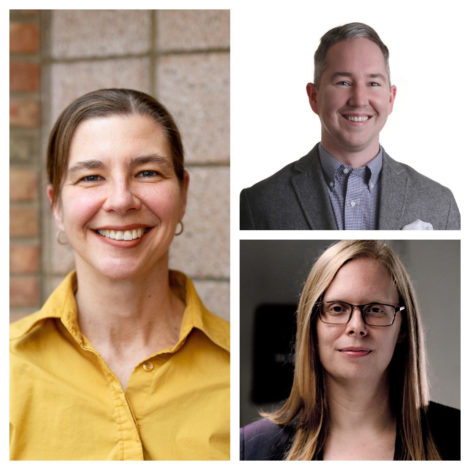a2ru Ground Works Awarded Grant from the National Endowment for the Humanities

Aug 15, 2023
A team from Ground Works, a2ru’s award-winning online platform for outstanding arts-inclusive interdisciplinary research, has received a Digital Humanities Advancement Grant from the National Endowment for the Humanities. The grant will fund Reco(r)ding CripTech: Rendering Artifacts of Process Legible and Accessible in an Online Archive, part of Ground Works’ ongoing Reco(r)ding CripTech project. This project documents the collaborative processes of five disabled artists in residence with the Leonardo CripTech Incubator, art-and-technology residencies that focus on disability innovation and aesthetic access.
The research team consists of Project Director Veronica Stanich (a2ru), Platform Developer and Co-Director Daragh Byrne (Carnegie Mellon University), and Cross-Disability Facilitator Elizabeth McLain (Virginia Tech), who will be joined by Digital Accessibility Consultant Luke Kudryashov and Digital Library Consultant Rikk Mulligan for the NEH grant activities.
The online archive created during the project will include “practice products”—the artifacts of the artists’ processes such as digitized notes, journals, and sketches, as well as recorded reflections, social media posts, correspondence, meeting minutes, and grant applications. The research team will explore best practices for the preparation, accessibility, representation, deposit, and citation of these items. As the research team writes, “These artifacts are sites of knowledge production in their own right, and just as they invite a different type of study, their formats and contexts require a different set of considerations for archiving and disseminating. The goal of this work is to make unique artifacts of disability- and arts-informed innovation processes available to humanities scholars, and ultimately to contribute to the knowledge base around creating a digital archive of such artifacts.”
Veronica Stanich, Managing Editor of Ground Works and director of the project’s research team, said: “We are so thrilled and encouraged to receive this support from the National Endowment for the Humanities. Through this project, our Ground Works team is working with CripTech Incubator artists and staff, and with ‘Reco(r)ding CripTech’ Advisors, to challenge and expand existing understandings of accessibility. We believe the resulting online archive is going to be a valuable resource for the artists and their communities as well as for scholars in many disciplines.”
Elizabeth McLain, an instructor of musicology at a2ru partner institution Virginia Tech and the project’s cross-disability facilitator, said, “Our team is excited to receive the support of the NEH to continue our work documenting the creative processes of the CripTech Incubator artists. For too long, disabled people have been treated as objects of study rather than generators of knowledge. The resulting scholarship on disabled artistic practice portrayed disability as a curiosity, an object of pity, or an obstacle to overcome. When disabled artists reclaim the narrative, the result is transformative. They reveal disability as creativity, innovation, community, and a culture all its own. Our hope is that by amplifying the stories of the CripTech artists, we will add to the growing movement to center disabled voices until “Nothing About Us Without Us” is not just a rallying cry but a reality for the disability community in the arts, education, and beyond.”
The Reco(r)ding CripTech project began in 2021 as part of an ongoing partnership between a2ru and Leonardo/ISAST. It has an Advisory Board including STS (Science, Technology and Society), Arts, and Disability Studies scholars such as Louise Hickman, Petra Kuppers, and Ashley Shew. In 2022, the American Council of Learned Societies (ACLS) awarded Reco(r)ding CripTech a Digital Justice Seed Grant, which supported access and equitable compensation at the data collection phase of the project as the research team worked with the artists to document their work through artifacts of process and through reflective journaling and conversation.
 The Digital Humanities Advancement Grants program from the National Endowment for the Humanities “supports innovative, experimental, and/or computationally challenging digital projects, leading to work that can scale to enhance scholarly research, teaching, and public programming in the humanities.”
The Digital Humanities Advancement Grants program from the National Endowment for the Humanities “supports innovative, experimental, and/or computationally challenging digital projects, leading to work that can scale to enhance scholarly research, teaching, and public programming in the humanities.”
Created in 1965 as an independent federal agency, the National Endowment for the Humanities supports research and learning in history, literature, philosophy, and other areas of the humanities by funding selected, peer-reviewed proposals from around the nation. Additional information about the National Endowment for the Humanities and its grant programs is available at: www.neh.gov.
